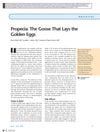 March 2014 in “Hair transplant forum international”
March 2014 in “Hair transplant forum international” Hair transplant surgeons should also focus on their patients' overall health, including regular check-ups and screening for common health issues.
 September 2005 in “Clinics in Plastic Surgery”
September 2005 in “Clinics in Plastic Surgery” The document provides a comprehensive index of medical and surgical topics, including hair removal, hair restoration, and various treatments for injuries and conditions.
[object Object] 
Finasteride is popular for treating male hair loss but may increase the risk of serious prostate cancer and has other potential side effects.
 July 1996 in “Annals of Internal Medicine”
July 1996 in “Annals of Internal Medicine” Taking high doses of fluconazole for a long time can cause reversible hair loss.
April 2023 in “Medizinische Genetik” Male-pattern hair loss is largely influenced by genetics, with key genes identified.
March 2023 in “JAAD case reports”  December 2022 in “Scholars journal of applied medical sciences”
December 2022 in “Scholars journal of applied medical sciences” Dutasteride 0.5mg improves hair growth in 78% of people with hair loss, but may cause sexual problems in some.
Natural products may help treat hair loss by promoting hair growth with fewer side effects.
 January 2022 in “Clinical Cases in Dermatology”
January 2022 in “Clinical Cases in Dermatology” Androgenetic alopecia, a common hair loss condition, can be treated with topical minoxidil, oral finasteride, or oral spironolactone, and new treatments like platelet-rich plasma, low-level laser therapy, and janus-kinase inhibitors are being explored.
 June 2019 in “Brain Imaging and Behavior”
June 2019 in “Brain Imaging and Behavior” Hair loss can indicate brain aging and potential small vessel disease, but more research is needed to understand the clinical impact.
January 2019 in “Menoufia Medical Journal” Lower vitamin D levels may contribute to female hair loss.
January 2018 in “Our Dermatology Online” Dutasteride injections can help hair growth in androgenic alopecia but need more research for long-term use.
 January 2015 in “Journal of Cytology and Histology”
January 2015 in “Journal of Cytology and Histology” Hair loss in Androgenetic Alopecia is not caused by damage to follicular stem cells.
 July 2011 in “British Journal of Dermatology”
July 2011 in “British Journal of Dermatology” Hormone treatment caused hair loss, finasteride helped regrowth.
 September 1997 in “Journal of The European Academy of Dermatology and Venereology”
September 1997 in “Journal of The European Academy of Dermatology and Venereology” Topical spironolactone effectively treats hair loss in women.
 93 citations,
February 2015 in “Journal of Investigative Dermatology”
93 citations,
February 2015 in “Journal of Investigative Dermatology” Oxidative stress affects hair loss in men with androgenetic alopecia.
 91 citations,
November 2007 in “Archives of Dermatology”
91 citations,
November 2007 in “Archives of Dermatology” Smoking linked to hair loss in Asian men.
 65 citations,
October 1999 in “Journal of The American Academy of Dermatology”
65 citations,
October 1999 in “Journal of The American Academy of Dermatology” Finasteride effectively reduces hair loss by decreasing androgen levels.
[object Object]  40 citations,
August 2018 in “Skin appendage disorders”
40 citations,
August 2018 in “Skin appendage disorders” Some alternative treatments for hair loss might work, but more research is needed.
 24 citations,
May 1982 in “Biochemical Pharmacology”
24 citations,
May 1982 in “Biochemical Pharmacology” These drugs cause hair growth without affecting testosterone or adrenal hormones.
 23 citations,
June 2017 in “Drug Design Development and Therapy”
23 citations,
June 2017 in “Drug Design Development and Therapy” Cyclodextrins improve finasteride's solubility and bioavailability for hair loss treatment.
 23 citations,
December 2004 in “Differentiation”
23 citations,
December 2004 in “Differentiation” Sex hormones affect hair and feather growth and may help manage alopecia and hormone-dependent cancers.
 22 citations,
March 2000 in “Clinics in Dermatology”
22 citations,
March 2000 in “Clinics in Dermatology” Many treatments for hair loss lack proper testing and FDA approval, so their effectiveness is uncertain.
18 citations,
November 2012 in “Current opinion in urology” Finasteride and dutasteride are equally effective and safe for treating benign prostatic hyperplasia.
16 citations,
January 2019 in “Pharmaceutical biology” Lespedeza cuneata extract may help treat enlarged prostate.
 16 citations,
September 2018 in “Journal of Ethnopharmacology”
16 citations,
September 2018 in “Journal of Ethnopharmacology” Plant-based remedies may treat hair loss by reducing inflammation and improving insulin resistance.
 16 citations,
January 2015 in “Current problems in dermatology”
16 citations,
January 2015 in “Current problems in dermatology” Alopecia Areata is an autoimmune hair loss condition that needs more research for better treatments.
 14 citations,
April 2006 in “Expert Review of Dermatology”
14 citations,
April 2006 in “Expert Review of Dermatology” Antiandrogen therapy helps treat genetic hair loss.
 13 citations,
March 2019 in “Journal of Dermatological Treatment”
13 citations,
March 2019 in “Journal of Dermatological Treatment” Finasteride can treat hair loss, but may have side effects; evaluate and inform patients of risks.
 12 citations,
September 2011 in “Archives of Dermatological Research”
12 citations,
September 2011 in “Archives of Dermatological Research” Policemen have more hair loss due to obesity, sunlight exposure, and stress.






















